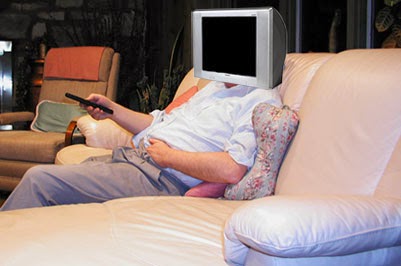The advent of cable television has ensured that at the click of a
button, the average viewer quite literally has hundreds of programmes to
choose from, widening the latter’s range of viewing options to a hitherto
unprecedented extent. Paradoxically, this phenomenon has served to restrict
the choices of the more discerning viewers among us. The pressing need for
profit maximisation felt by the television networks in this age of increased
competition in the media arena has resulted in the flooding of the market
with mass produced spin-offs of the same formula, churned out, factory style,
at a decidedly alarming rate. The trite banality of the bulk of these
programmes renders them unappealing viewing, as not only do they lack
any form of aesthetic originality and creative input which genuinely enhance
the enjoyment of the viewer’s experience; at a more insidious level, the sheer
inanity of such sorry specimens of programming can actually lead to a mind-
numbing mental atrophy of sorts.
The first genre which comes to mind in any discussion of the “trivial
rubbish” that is aired on television would be the drama, fondly known by
legions of housewives (and husbands) as their soap opera. While some might
argue that the ever expanding range of soap operas is growing wittier in
terms of plot and dialogue in comparison to its rather trite predecessors, it is
also evident that due to the more permissive moral standards of our day,
there is more sex explicitly depicted on screen than ever before. This writer
has no puritanical objection to the barest hint of flesh in terms of the moral
degeneration that television coverage of sexual content will undoubtedly
cause; rather, the concern is that the contrived manner in which modern
soaps tend to portray sex actually trivialises the very act itself. The OC, an
abbreviation for the Orange Country, depicts the lifestyle of a group of
favulously wealthy mobile and physically flawless young adults who frolic in
one of America’s most up-market counties. These Adonises and Aphrodites
while away their seemingly endless hours by indulging in a languid, amorous
game of musical chairs in each other’s beds. After the third or forth episode,
the view becomes somewhat inured to the constant, mindless switching of
partners; and one is left quite unfazed, even ambivalent during the
denouement when the strapping male protagonist saunters into his own
bedroom to find his newly wed wife taking a gambol between the sheets
with their next door neighbour – it is difficult to truly care for his plight when
one knows all too well the details of his own bed rendezvous with the same
neighbour’s finance. Sex sells, a principle that network markets are adept at
exploiting; but when overdone, the sheet inanity of it evokes a response in
the viewer which comes close to repulsion.
In the late 1990s, the reality television genre made its debut on the
screen with the much touted series “Survivor”. The emergence of this genre
was (purportedly at least) in large part as a protest against the affected
melodrama of the abovementioned soap opera viewers wanted to see real
people in real life situations. Ironically, the genre seems to have degenerated
into a host of miniature soap operas, which if not completely scripted, are
very much edited and doctored to present a more dramatic and often
unreflective piece of the actual reality that goes on during filming. This
selection process has made reality television perhaps an even more fitting
subject for the criteria in the question. The standard formula of cat-fighting,
sex and romance, which has the additional advantage of low cost
production, has resulted in endless spin-offs of this successful prototype. The
popular programme, “The Bachelor”, has spawned “Who Wants to Marry A
Millionaire?”, “Joe Millionaire” and “Average Joe”, to name a few. After
watching the hundredth nameless blue-eyed blonde with perfectly coiffured
tresses, and the acrid tongued brunette with a slick bob, polishing their nails
while figuratively digging their claws into their competitors for the impossible
suave male prize’s attention, one becomes rather desensitised to the
predictability of the endless stream of catty gossip, and can only wonder at
the rapid evanescence of the initial attraction the programme’s novelty held.
This fact is clearly recognised by the producers of The Bachelor, who have
introduced the concept of a plant amongst the contestants in a desperate
attempt to heighten the tension and woo viewers back.
Contrary to the assertion, quality programming is surprisingly available
on television – consider scientific documentaries on National Geographic
channel. However, programmes with such academic content are often dull
and dry.
Is it possible, one might ask, to combine economic interests and
popular entertainment with genuine art, something full of impact and
originality? The answer must be a resounding “Yes”. As a welcome breath of
fresh air in this age of stale programming, the Star Trek Voyager Series
manages to encapsulate both seemingly contradictory ends. The space age
setting of phases, starships and exotic aliens satisfy the visceral demands of
television programmes, television being an inherently visual medium. The plot
transcends being simply action-packed by being refreshingly original as well.
It ropes in scientific concepts and phenomena and builds a storyline which
extrapolates from them, making for intelligent viewing. Above all, into each
episode is woven serious moral questioning about the fundamental human
dilemmas. The producers take pains to avoid being didactic, and the
storylines challenges, provoking reflection, rather than simply dishing out a
neat, easy answer. This, perhaps, is television at its best one’s enjoyment of
the engaging programme is deepened and prolonged by the intellectual
and emotional satisfaction acquired in responding to its theme and issues.
In conclusion, although the prospects of the television scene today in
general appear bleak, with a little bit of effort, if one searches persistently
enough, programmes worth watching are perhaps not quite as extinct a
species as one might originally have though.

0 comments:
Post a Comment